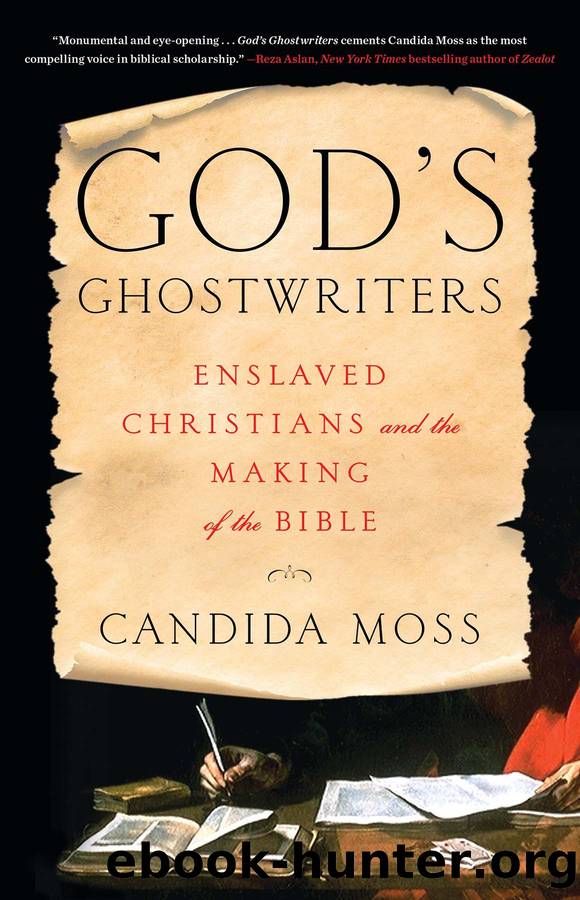God's Ghostwriters by Candida Moss

Author:Candida Moss [Moss, Candida]
Language: eng
Format: epub
Publisher: Little, Brown and Company
Published: 2024-03-27T00:00:00+00:00
Though copyists were also curators who repaired and preserved human knowledge, this is not how they have been remembered. From antiquity to the present day, those invested in ancient textsâfrom academics to modern Christiansâhave worried about what took place in the bookstores of antiquity. The concern is fraud, deception, and what is broadly described as âtextual corruption.â
It is a matter of fact that the manuscripts of the New Testament that have survived from antiquity all differ from one another. They were produced by hand in a culture that was acutely aware of the impossibility of perfect duplication. Even coins, the metallic backbone of commerce and trade, were struck by hand and thus differed from one another. In general, ancient people had a tolerance for variation that we do not share. When egregious errors were made, however, both ancient and modern analysts have tended to blame copyists. Much like enslaved workers in general, artisanal workers were an easy target for undeserved accusations of forgery, corruption, and distortion. An elite line of argument, grounded in little more than classism and shared by some early Christians, saw those who manufactured books as uneducated tradespeople and potential forgers. The caricature has, unfortunately, stuck.
The problem was essentially spatial. Ancient curators performed their work in workshops and bookstores: spaces that were typically out of the sight of enslavers and customers alike. In antiquity, this made their work inherently suspicious. Lucian, in his criticism of the celebrity wonder-worker Alexander the False Prophet, lists the textual specialists that Alexander employed as part of his fraudulent empire. Alexander would instruct paying visitors to write their questions for the god on scrolls, which were then sealed and taken into the inner sanctuary of the temple. Secreted away, Alexander and his team would unseal the scrolls, read them, formulate a response, and carefully reglue the seals. The prophecies Alexander delivered to the desperate pilgrims were just a sham perpetrated by a group of literate artisans (Lucian lists researchers, oracle writers, oracle curators, clerks, seal manufacturers, textual interpreters, and translators among them). The same skills that preserved the ancient library, Lucian imagined, could be used to forge a new one. So too one rabbinic text warned that the raw materials of the bookshopâworn-out manuscripts and semi-finished parchmentâcould easily benefit the forger. Unless they were willing to spend each workday hovering over the workbench, elites could only imagine the subversive and deceitful uses to which the artisanâs skills might be put.34
The negative characterization of copyists is not only an ancient prejudice. The impulse to return to the âoriginalsââthe original events, the original intentions of the authors, and the original texts that they composedâhas animated academic conversation about the Bible since the Renaissance. These interests were nurtured by a scientific turn during the Enlightenment and constantly reenergized by the discovery of new manuscript fragments in Egypt, Israel, and Palestine, and private and public collections. In an era of conquest that styled itself as discovery, scholars saw themselves as plucky adventurers rediscovering the Truth. Truth, of course, is elusive when great distances are involved.
Download
This site does not store any files on its server. We only index and link to content provided by other sites. Please contact the content providers to delete copyright contents if any and email us, we'll remove relevant links or contents immediately.
| General | Discrimination & Racism |
Nudge - Improving Decisions about Health, Wealth, and Happiness by Thaler Sunstein(7694)
The Fire Next Time by James Baldwin(5432)
iGen by Jean M. Twenge(5409)
Adulting by Kelly Williams Brown(4567)
The Sports Rules Book by Human Kinetics(4379)
The Hacking of the American Mind by Robert H. Lustig(4375)
The Ethical Slut by Janet W. Hardy(4243)
Captivate by Vanessa Van Edwards(3838)
Mummy Knew by Lisa James(3686)
In a Sunburned Country by Bill Bryson(3537)
The Worm at the Core by Sheldon Solomon(3486)
Ants Among Elephants by Sujatha Gidla(3463)
The 48 laws of power by Robert Greene & Joost Elffers(3254)
Suicide: A Study in Sociology by Emile Durkheim(3019)
The Slow Fix: Solve Problems, Work Smarter, and Live Better In a World Addicted to Speed by Carl Honore(3007)
The Tipping Point by Malcolm Gladwell(2914)
Humans of New York by Brandon Stanton(2868)
Handbook of Forensic Sociology and Psychology by Stephen J. Morewitz & Mark L. Goldstein(2704)
The Happy Hooker by Xaviera Hollander(2687)
